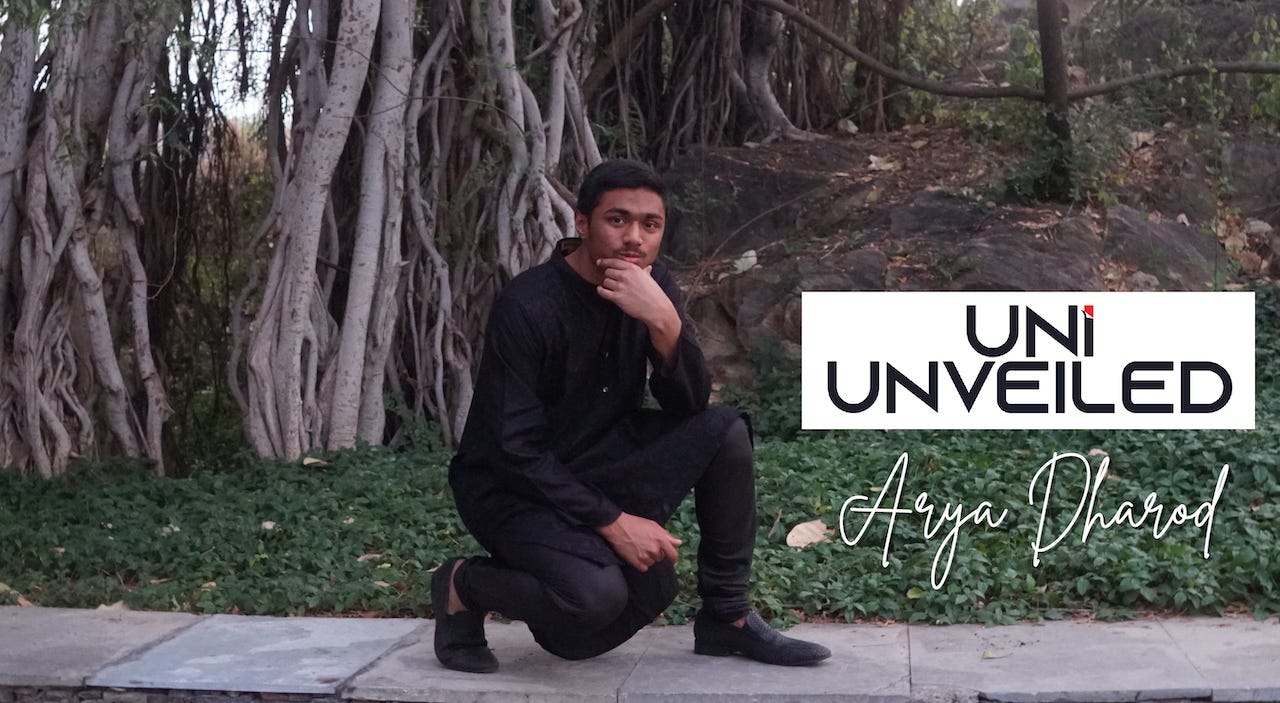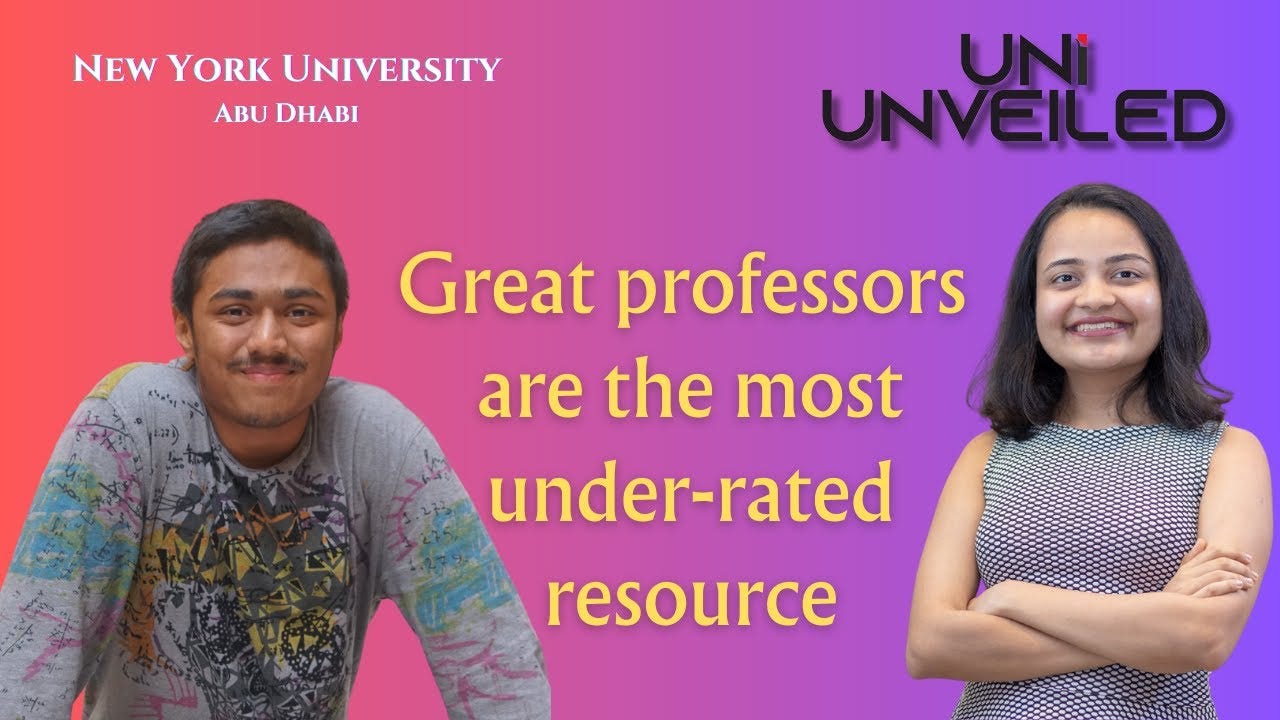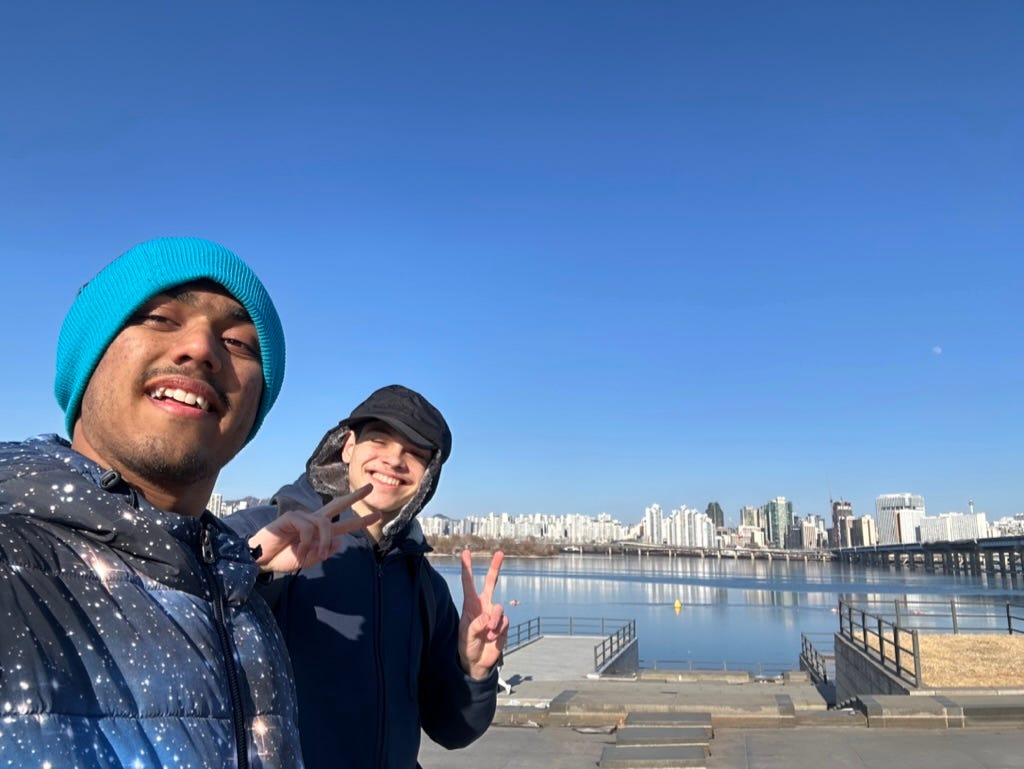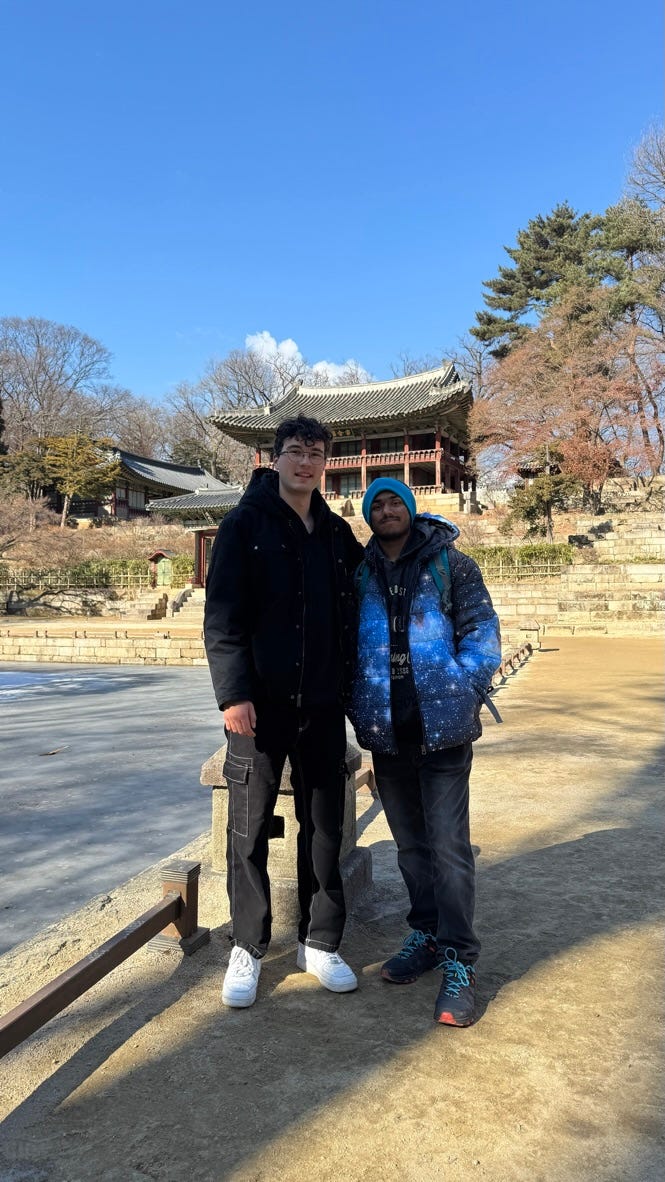Uni Unveiled: Volume 1
The 4.0 GPA trap, books are indeed judged by their covers, and a practical guide to conducting cold outreach
So, my newsletter has a new name, theme, and format. What’s going on?
After some careful deliberation, I’ve realized that while presenting my Minerva journey, experiences, and interesting conversations was wonderful, it’s time for this newsletter to expand its scope to talk about university life, more broadly. I want this to remain applicable to every single high schooler out there who wants their four years at university to truly mean something and help them achieve their personal and professional goals. So, welcome to the ‘Uni Unveiled’ newsletter where I will present the holistic university experience in its naked truth (good, bad, and ugly) to hopefully guide the world’s ambitious, intentional, and reflective teenagers through key insights, wisdom, and nuggets of advice from a college sophomore who is far from having satisfying answers but is at least attempting to ask deeper questions about how to really maximize these four years at whatever institution one ends up attending.
I am a student at Minerva University, the world’s most innovative university, where I will travel to 7 global cities over 4 years (San Francisco, Taipei, Seoul, Buenos Aires, Hyderabad, Berlin, and Tokyo) for my culturally immersive Undergrad. I am pursuing Economics and Psychology, and who knows where that may lead, post-graduation! I also run my own podcast where I engage in authentic conversations about the 360-degree university experience with students from the top global institutions like Harvard, UC Berkley, UCLA, Oxford, LSE and beyond… The newsletter and the podcast are meant to complement each other so if you enjoy reading this newsletter and are curious to hear new voices share their thoughts on university, I highly recommend checking out the podcast here:
https://www.youtube.com/channel/UClokZrNuc41VBDMhZYuN2RQ
Now, let’s begin deconstructing this big, bold, highly intimidating word called ‘University’. Together.
Episode spotlight: NYU in Abu Dhabi?! | History and Film | Sakshi Gala
Did you even know that New York University has an Abu Dhabi branch? With remarkable scholarships, incredible student diversity, a proper campus unlike the more ‘city campus’ vibe of NYU in New York City, tons of travel and study abroad opportunities (like January terms), and more intimate classes, the NYU Abu Dhabi campus truly gives tough competition to the New York City branch!
Some topics we explored during the episode:
· How each of the four years at university are similar and different from each other (in terms of priorities, mindset, challenges, etc.)
· How to maximize the value of your university’s alumni network
· Creative ideas for spending university summers beyond summer internships
· How to prepare and differentiate yourself during Undergrad if you are clear on entering a Masters/PHD program soon after graduation
· How to manage finances and budgeting at university
If this sounds appealing and you are curious to hear more from the expert herself, watch the full episode here:
University applications: Slaying the dragon
University applications are complex, grueling, and intense. I’ve been through the grind and seen every one of my friends and classmates struggle to the finish line. We’ve been there, tears, rejections, curse words, and all! If you are currently working on your university applications, I just want you to know that tough times build stronger men and women – keep hustling, you’re not done until you decide you’re done. Having said that, there are a couple of practical tips and tricks I can share that will help you work smarter, not just harder, starting with…
Location does matter: you are spending four years in that place!
Nearly every guest on my podcast has mentioned with regret that they should have given greater consideration to their university’s location. Many of my guests didn’t think twice before accepting offers from their dream universities and only on their first day on campus did they truly consider that this was where they were going to be spending the next four years of their life.
New York University, London School of Economics, King’s College London, University of Chicago, University of Toronto. These leading universities have ‘city campuses’ which are not traditional, neatly defined campuses, rather their buildings are scattered sometimes all over the city with the dorms, lecture hall and dining hall perhaps in different districts altogether! While you have the benefit of being in the heart of the city, right where the action is, maybe there is the missing element of the romantic vision of a fancy, well-defined university campus which certainly was in my mind when I pictured NYU.
The contrasting experience is living in a college town. The term refers to small towns or suburban areas where the majority population is of the university itself. Most American liberal arts colleges find themselves in these college towns, at least an hour’s drive away from a big city. Dartmouth, Purdue, Syracuse University, these are all excellent educational institutions but you will have to adjust for four years to a quieter, more rural, sub-urban lifestyle, probably only visiting the big city on weekends or during breaks. The peace, quiet, and proximity to nature may be wonderful for some students, but can definitely be a tough transition for students who have grown up in big cities and enjoy the sensory stimulation, night-life and hustle-bustle culture on the streets.
Your professional growth through networking, events, conferences, physical internships will often happen even outside your college community, hence for specific majors it makes sense to think about which cities are hubs for certain industries/fields (ie. Boston for biotech, San Francisco for AI, New York City for finance, LA for entertainment and media, Washington DC for public policy and government). I would probably give priority to the institution itself over the exact city, but it’s worth trying to find the best of both worlds because it’s a huge advantage to be able to connect with industry professionals and attend cutting-edge events in the field which you are majoring in because it brings real-world relevance and practicality to your theoretical, academic approach to the subject in class.
‘Been there, done that’: Lean on your seniors
In my frequent debates with my younger brother about who’s more fortunate, I always remind him that he has 3.5 extra years of borrowed life experience, learnings, and wisdom, because that is the age gap between the two of us. Your seniors have been there and done that: we’ve made the stupid mistakes, we’ve done things we regret, we’ve made our fair share of bad decisions – let us share those mistakes with you so that you can make new mistakes instead. You don’t need to learn every lesson the hard way…
Spending too much time on academics, exams, and the dreaded 4.0 GPA
The #1 regret that has come up time and time again from guests on my podcast is studying too much and too hard during university, unable to maximize all the non-academic opportunities and resources available to them if only they had looked up from their textbooks. I had a valedictorian guest tell me that if he could go back in time and change one thing about his college journey, he would have traded the prestige of this valedictorian title for more time to spend on building cool projects, networking, and even dating.
We go through our entire schooling journey treating grades as the default benchmark of success. And indeed, high school grades do play a huge role in which university you end up at. But the moment you enter college, the metrics of success diversify – its not just grades but also the connections you build, the internships you do, even the amount of personal growth you experience which becomes a key indicator of a successful university journey. In an ideal world, one would maintain the 4.0 GPA while also succeeding in diverse other areas of university life, but alas you are a finite being with infinite ambition and hence sacrifices must be made.
I am a big believer in the Pareto principle: 20% of the input can yield 80% of the output, but the remaining 20% of the output requires 80% additional input. That’s precisely how I approached my academics even in high school. The sheer effort it takes to move from an A minus to an A just didn’t feel worth it to me, because I was generating significant outputs by putting that same energy into my side projects and extracurriculars, like writing books, learning the drums, and attending other online programs. And such trade-offs are vital at university – the choice to study vs. attend an event vs. join a new club vs. enjoy a fun evening with friends: you just can’t be in 10 places at once, my dear!
Here's my suggestion. If you are still dedicated to that 4.0 GPA, that’s okay, but have a strong understanding of why you want it. Avoid the silly traps of peer comparison of grades and proving your intelligence through a reductionistic number. If the 4.0 GPA opens up opportunities for you like Teaching Assistant roles or research opportunities, then its worth considering especially if academia is your future direction. But if you want to write code or build companies or sell products, just know that the classroom won’t equip you with all the numerous hard and soft skills your career will require – there are certain competencies like adaptability, resilience, project management, which simply cannot be perfected in a lecture hall. For those of you who are now eager to be more efficient with your academics and study time, I recommend setting a cut-off GPA, like mine which is a 3.6. Below this cutoff grade, you will be unsatisfied with your academic performance and ramp up the effort, but the moment you cross this benchmark, you will begin ruthlessly monitoring how much time you spend in your textbooks because you have nothing to prove by getting a 3.9 when it takes an entire weekend of studying indoors and missing a networking event.
You are at university to learn and grow, not be a test-taking machine. Never compromise on your learning – I will insist that you show up to lectures (yes, even the 9 AM ones!), that you go to your professors in office hours, and ensure no fundamental gaps in your knowledge of a subject. But begin making distinctions between fundamental skills and knowledge vs. nitty-gritty details which may be more relevant to an upcoming exam than the future trajectory of your career dreams.
Coming of age
I first read ‘Life of Pi’ as a 15-year-old and the novel left a lasting impression on me, giving me the confidence to more seriously and intentionally transition myself from teenage-hood to manhood. Despite all the insane, physical challenges Pi faces like the ocean, the tiger, starvation, etc., the novel fundamentally represents the inner struggle of adulting, of the journey from being a boy to becoming a man. Adulting is a big word and an even more colossal journey we all must embark on, and for many students, college is where this journey commences. As a sheltered, protected, and over-comfortable young boy for 17 years of my life which I spent in the safety of home with my family, taking that 20-hour flight to San Francisco was terrifying and exhilarating at the same time. Over the last 1.5 years I’ve continuously refined my outlook on what it takes to make this transition from teenage-hood to adulthood, so hopefully I can at least plant the seeds of thought in your minds to get the ball rolling, before your ‘flight’ officially takes off.
Presentation matters
I think there’s wisdom and truth to the saying ‘Don’t judge a book by its cover’. And I wish the whole world internalized that saying. But alas, we are irrational human beings – consciously or subconsciously we form impressions of people based on the slightest details we notice and those first impressions are sticky. In college, you must come to accept this fact that often, the book is judged by its cover. Especially in professional contexts like with busy professors, industry professionals, recruiters, you must accept that these people who may be invaluable to your career growth simply don’t have the time or willingness to even read your first page.
The good news? You can take simple, practical steps towards beautifying that book cover and this is a vital aspect of adulting.
I was in your shoes once. I was that guy. The guy who walked around dragging his shoes, hands in his pockets, headphones around his neck, walking into a fancy restaurant with shorts and a plain t-shirt. There is flexibility we enjoy as middle and high schoolers of being less intentional about creating powerful first impressions, because we are still somewhat under our parents’ stable wings. But once you’re in college, people care about who you are as a self-sufficient individual, not the family you come from. And it is imperative that you stand out from the crowd.
Great presentation requires attention to detail. It’s about the aura/energy you bring with you when you step into a room or enter a discussion. Treat yourself with the level of respect you expect others to treat you with. Let’s make this actionable:
· It’s always safer to be slightly over-dressed than under-dressed. Even among your friends, you will be noticed and appreciated for being prim and proper even if your buddies are just hanging out for the day.
· Be intentional about the way you walk. What message are you communicating to the room when you take 10 steps forward? Stand straight and tall, walk with purpose, confidence, and intention. Eyes should turn and focus on your stride when you enter a room.
· Greeting. Especially in professional contexts, subtle gestures are crucial: the intensity of your handshake, the warmth of your smile, the eye contact you make with the other person to show them you are truly listening and not wasting their time. Make it a point to greet all or most people in any room you enter – in my experience, people care more that you are an interested person rather than an interesting person.
· Your elevator pitch. How do you respond to the question ‘So who are you?’ or ‘What do you do?’ in both a casual and more professional context? This will refine itself over time but keep reflecting on how you would like to present yourself, your work and your passion to people who simply don’t have enough time to hear your entire life story. Start with a template which you save on your computer but be flexible to adapt that template given the person and situation.
· Written communication is a low-hanging fruit to making incredible first impressions, especially if you are less confident in your spoken English communication. Many people will make their first judgement of you based on that initial text message/e-mail/LinkedIn message you write to them. There is less room for error here simply because there are less ways for the other person to judge you beyond your writing skills. A clear subject line for all e-mails, the necessary salutations and pleasantries like checking in on their health/project/company, and the use of powerful and impressive vocabulary (even if that you must lean on AI for this one!) can go a long way. A single well-drafted e-mail can open up many doors in your life…
Save yourself the effort it takes of repairing a poor first impression and instead make your life significantly easier by making stellar first impressions. Even the world’s most delicious cake is enhanced with that simple rose petal on top!
Knowledge is just a means to an end
Enough knowledge. Its time to take action. People will listen and be impressed by the intelligent things you have to say but they will judge your character and dedication by your work, which should speak for itself. I tend to be a high-level, macro, abstract thinker which is the tone I find useful to adopt for a newsletter like this. But I want to challenge myself to close each newsletter off with a highly practical, actionable guide because sometimes hand-holding does help…
Cold outreach
As an ambitious and proactive high schooler, I assume you may already be reaching out to industry professionals, professors, companies, CEOs, researchers, potential mentors, for coffee chats and maybe even further opportunities they can provide you with. It took many frustrating iterations for me to land up at the powerful cold outreach message template I am about to share with you, so I hope this provides a useful starting point for you, to then customize based on your requirements.
· Begin with ‘Hi, my name is (insert name), I’m (insert age) years old, I am currently working on (insert occupation/project) and I’m from (insert city/country). I find mentioning my age (18 years) valuable because it generally impresses people that an 18-year-old is travelling the world for university and working on a couple of interesting projects beyond just his academics. I mention my city/country because I feel it adds a personal, emotional touch to you as an individual.
· I am passionate about (x, y, and z) – this must be flexible depending on the person you are interacting with. An astrophysics professor may or may not share your love for performance poetry but they see relevance when you mention your love for understanding the origins of the universe. My golden number is 3 passions so that at least 1 of them sticks. If your personality is also more casual and light-hearted, you may consider adding a fourth passion which is a niche hobby like scuba diving, pottery, fishing – the intention here is to highlight yourself as an interesting person to talk to outside of work.
· Compliment the person briefly – make it specific so its not ingenuine. I was mind-blown by your article on (XYZ) where you brought up the concept of (XYZ) vs. you are my role model sir!
· Build your own credibility in this field. Share with them any significant projects you have worked on in the relevant field – an article you’ve written, a video you recorded, an internship you did. If nothing else, at least share with them 2-3 highly perceptive and specific questions you have about the field, which you are currently researching.
· Why you are reaching out and what is your ask of them – Clarify why you are reaching out to them specifically given their expertise/experience. Make them feel that they are the right person for this job and that it is essential to your progress on XYZ project/career path that you take their valuable input.
o Finally, make the specific ask. What exactly can they help you with? Your ask should be simple and concrete, ie. a 30-minute coffee chat, brief answers to a few highly specific questions which you are unable to answer through your own research, or a specific opportunity you’re aiming for, etc.
· Closing remarks – Never forget to wish them a wonderful day or week and thank them for their time. Don’t be transactional.
Here’s an exemplar from my e-mail to Ranveer Allahbadia, India’s top podcaster, requesting for a 30-minute virtual coffee chat.
Dear Ranveer,
I’m Arya Dharod, an 18-year-old student pursuing Economics and Psychology at Minerva University, currently based in San Francisco.
I am passionate about podcasting, social media growth, and engaging in controversial geopolitical debates with peers.
Your episode with Naval Ravikant transformed the way I view ‘rational Buddhism’ as a tool for self-improvement. I especially loved how you used mirroring and labelling during that episode to elicit deeper insights from Naval. I consume your podcasts on a weekly basis as a powerful tool for my own lifelong learning.
I run my own podcast with 40 published episodes and over 2,000 minutes of deep conversation with university students about their authentic college journeys.
I am struggling to grow my podcast on social media platforms and attract more viewers and subscribers – as India’s top podcaster, I would love to hear how you strategically approached the scaling up of your content in such a short time span.
Would you be open to a 30-minute virtual coffee chat to discuss the above with me?
I want you to know that you work has a profound impact on the lives of young people across our country, so please continue to inspire us all! Have a magical week!
Warm regards,
Arya Dharod
^That was on the longer side but this is a good base from which you can then edit and cut sections which are less relevant to you. A compressed version of this same message is what I used for my LinkedIn cold message of maximum 300 characters.
This is the basic level of effort that has to go into any important cold outreach you do. Many of my classmates at Minerva would call the above effort insufficient and still too vague.
Assume a 10-20% response rate for all cold outreach you do. If your numbers are higher, great job, you are getting something right! If your numbers are lower, seek guidance and advice from peers and mentors on how to improve your message. Busy people are busy people. Don’t be disheartened when your role model doesn’t reply to your beautifully drafted message (just like Ranveer didn’t reply to mine!), keep playing the game and probability 101 says that something has to stick.
Fun times…
As you continue networking, applying to summer internships and acing your classes, don’t forgot that university is also the time to drink, party, travel, play board games, watch movies and enjoy your campus life – you are not a robot whose life is measured by KPIs!
To conclude, here’s a fun picture of what I’ve been up to in Seoul over the past month with dear friends:
Less fear, more love….








